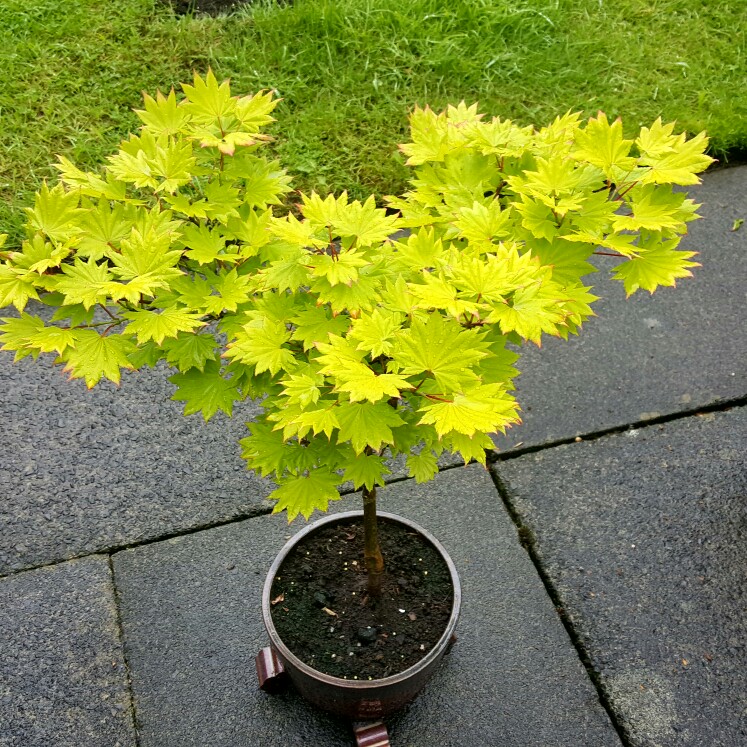
Acer shirasawanum 'Aureum'
Golden Full Moon Maple
Acers (or Maples as they are commonly known as) are trees and shrubs grown mainly for their colourful foliage. Many varieties are the trees and shrubs responsible for spectacular Autumn colours. There are many different types of Acer, from the smaller types, such as the very popular Acer palmatum (Japanese Maple) grown in many gardens, to the large maple trees that can grow up to 45 m in height. Most species have palmate leaves that are lobed (usually 3 - 9 lobes). The flowers, which are green, yellow, orange or red, in racemes, umbels or corymbs, appear in early Spring, and are followed by fruit, - samaras - or "helicopters", "whirlybirds" "maple keys" or "polynoses" due to the way they spin as they fall in Autumn. Acer shirasawanum is a species Acer native to Japan and is often called the Full Moon Maple or Shirasawa Maple. This species has leaves that are round, palmate, lobed (usually 9-13 lobes) and not deeply incised. They are grown mainly for their coloured foliage - particularly Autumn foliage. 'Aureum' has leaves which are yellow through the summer, gradually turning lime green, and has crimson flowers. The leaves have red with orange tints in autumn.
Contributed by @caroline
-
Full sun to partial shade
-
Occasional watering
-
Frost Hardy: 23F (-5°C)
-
Light and free draining
Common name
Golden Full Moon Maple
Latin name
Acer shirasawanum 'Aureum'
type
Trees or Shrubs
family
Sapindaceae
ph
4.5 - 6.5 Acid - Neutral
Plant & bloom calendar
-
Best time to plant
-
When the plant will bloom
full grown dimensions
 4.00 M
5.00 M
4.00 M
5.00 M
Acer shirasawanum 'Aureum'
Acers (or Maples as they are commonly known as) are trees and shrubs grown mainly for their colourful foliage. Many varieties are the trees and shrubs responsible for spectacular Autumn colours. There are many different types of Acer, from the smaller types, such as the very popular Acer palmatum (Japanese Maple) grown in many gardens, to the large maple trees that can grow up to 45 m in height. Most species have palmate leaves that are lobed (usually 3 - 9 lobes). The flowers, which are green, yellow, orange or red, in racemes, umbels or corymbs, appear in early Spring, and are followed by fruit, - samaras - or "helicopters", "whirlybirds" "maple keys" or "polynoses" due to the way they spin as they fall in Autumn. Acer shirasawanum is a species Acer native to Japan and is often called the Full Moon Maple or Shirasawa Maple. This species has leaves that are round, palmate, lobed (usually 9-13 lobes) and not deeply incised. They are grown mainly for their coloured foliage - particularly Autumn foliage. 'Aureum' has leaves which are yellow through the summer, gradually turning lime green, and has crimson flowers. The leaves have red with orange tints in autumn.
Propagating by grafting
From Early Summer TO Mid Summer
Some acers or maples are best propagated by grafting. This certainly applies to 'Shirasawanum' varieties.
Flowering
From Early Spring TO Early Spring
Most acers and maples have somewhat insignificant flowers. The flowers can be green, yellow, orange or red, and usually appear in early Spring, and are an early source of nectar and pollen for bees.
Planting
From Late Winter TO Early Spring
Smaller varieties can be grown in pots and containers. The best time for planting is late Winter / early Spring, before the leaves appear
Propagating by cuttings
From Late Spring TO Mid Summer
Propagation methods vary according to the variety. Most varieties are propagated by means of softwood cuttings.























